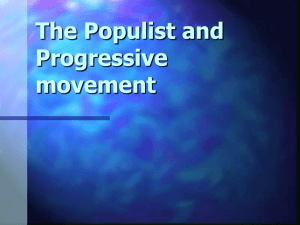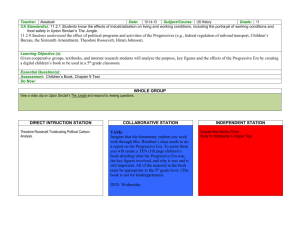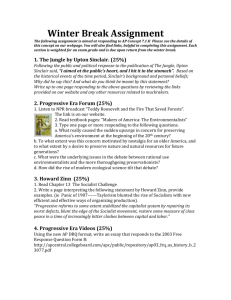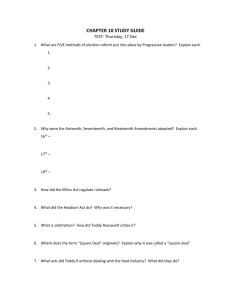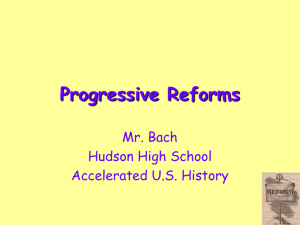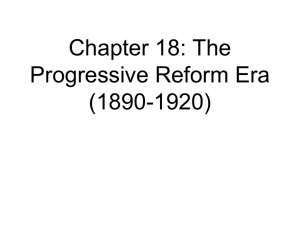Chapter 17 - Newton.k12.ma.us
advertisement
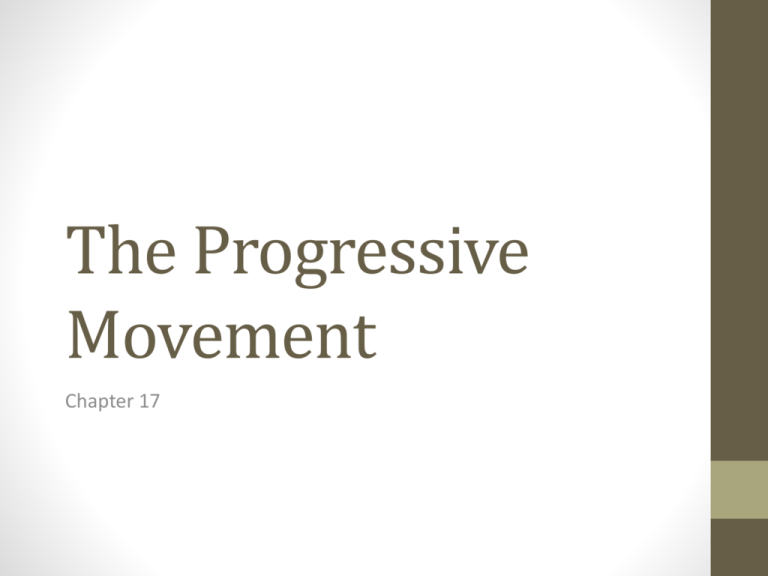
The Progressive Movement Chapter 17 Origins (Progressives Share Common Beliefs) • What did progressives believe? Industrialization and urbanization had created troubling social and political problems. • What movement was progressivism similar too? Populism (remember when we talked about this?) What is wrong with this picture? (Two things?) Origins (Problems targeted?) • Women? - The right to vote • Corrupt and Ineffective government? - Urban health issues (water etc..) - Bribes to politicians • Big Business, economics and labor? - Trusts and monopolies - Wealth gap between rich and poor - Labor unions and workers rights Mukrakers What does your group see in these quotations? Upton Sinclair The Jungle • Jurgis Rudkus and his wife, Ona Lukoszaite, are part of an extended family from Lithiuania that moved to Chicago for a better life. • Chapter 14 is one of the most well known chapters in this novel. This highlights the horrors of meat packing industry as well as the family struggles during this period in America. Mukrakers Upton Sinclair The Jungle • "This is no fairy story and no joke; the meat will be shoveled into carts and the man who did the shoveling will not trouble to lift out a rat even when he saw one." - Upton Sinclair, The Jungle, Ch. 14 1. What 3 adjectives come to mind if you were an American citizen reading this passage about the meat packing factories for the first time? 2. What federal government agency was created in response to this book? - The Food and Drug Administration (FDA) Mukrakers Upton Sinclair The Jungle • "They were beaten; they had lost the game, they were swept aside. It was not less tragic because it was so sordid, because that it had to do with wages and grocery bills and rents. They had dreamed of freedom; of a chance to look about them and learn something; to be decent and clean, to see their child group up to be strong. And now it was all gone-it would never be!" - Upton Sinclair, The Jungle, Ch. 14 1. How does this passage show the loss of the American Dream for the Rudkus family? Select two lines to support your point. Muckrakers (Ida Tarbell) • “If it has taught us anything, it is that our present law-makers, as a body, are ignorant, corrupt and unprincipled; that the majority of them are, directly or indirectly, under the control of the very monopolies against whose acts we have been seeking relief. . ” ― Ida Tarbell • What is she writing about? What sentiments of the progressive reforms are present here? - Standard Oil - Trustbusting and Government Corruption Progressives Reform Society (Education) • What was the Social Gospel? How did it apply to progressivism? • What was the idea behind Jane Addams Settlement Houses? • What was the Keating-Owens Act of 1916? What happened to it and when did it actually go into effect? - Banned Child Labor - Declared unconstitutional by Supreme Court - 1938 • John Dewey’s views on education. We can do an old school class day now. Our Lesson for the Day Progressives Ida Turnball Jane Addams Social gospel Settlement House Referendum Recall Intiative Direct Primary Labor Reforms Why did the day March 25th, 1911 change things in New York City? The Triangle Shirtwaist Factoy Fire March 25th, 1911 Triangle Shirtwaist Factory Fire Family members identifying bodies becomes an open casket viewing and public mourning period. Labor Reform (Triangle Shirtwaist Fire Protests) The New Evening Journal (March, 1911) Labor Reform (Triangle Shirtwaist Fire Protests) Reforming Government Who remembers this list? The Populist Platform of 1890 Galveston Hurricane (How did this lead to reform?) Galveston Plan in Delray, FL (Commission Form of Gov’t) Progressive Reforms “Fighting Bob” LaFolette • What reforms can be attributed to him? 1. Direct Primary 2. Railroad reform 3. Other Progressives - Hiram Johnson - Teddy Roosevelt - Woodrow Wilson Populist Reforms (1890) Which of these were adopted? 1. 2. 3. 4. Direct election of U.S. Senators Single term for President and V.P. Secret ballot to end voter fraud Initiative to allow people to introduce bills to federal and state legislatures 5. Recall to allow people to remove elected officials. 6. Referendum to allow people to approve bills after passed by the federal and state legislatures. Populist Reforms (1890) That were adopted by Progressives 1. Direct election of U.S. Senators 2. Secret ballot to end voter fraud 3. Initiative to allow people to introduce bills to federal and state legislatures 4. Recall to allow people to remove elected officials. 5. Referendum to allow people to approve bills after passed by the federal and state legislatures. Louis Brandies famous quotation • Laboratories of democracy is a phrase popularized by U.S. Supreme Court Justice Louis Brandeis in New State Ice Co. v. Liebmann to describe how a "state may, if its citizens choose, serve as a laboratory; and try novel social and economic experiments without risk to the rest of the country."[1]Brandeis was an Associate Justice on the Supreme Court of the United States from 1916 to 1939. -www.wikipedia.org • How does this apply to Robert La Follette? 17.4 – ROOSEVELT’S SQUARE DEAL #26 PRESIDENT’S VIDEO • We will watch the video and answer the questions on the worksheet. This video essentially covers everything from this section (17.4). Also, the Foreign Policy section is new and was not in this section. You are responsible for all the material on this worksheet. https://www.youtube.com/watch?v=sBpfih7w4B8 TR Video Answers 1. Republican 2. - He was both a Republican and Democrat. - He did what was right for the American People 3. A gallon 4. His incredibly energetic personality 5. Too much power in the hands of corporate America. 6. J.P. Morgan 7. To halt its monopolization of the Western railways 8. The US government won and the monopoly ended. TR Video Answers 9. - He was more a “trust regulator” - He wanted to make sure they didn’t get out of control 10. The President must intervene when the national interest is at heart. People would freeze if the strike wasn’t resolved. 11. - He threatens to send the army to “nationalize” or take over the mines - It was the first time gov’t was on the side of labor 12. The Square Deal 13. A world leader 14. Colombia TR Video Answers 15. He encourages and militarily support a revolution in Panama to gain control of the canal 16. No, he says “I built the Panama Canal” 17. To get debtor nations to repay their loans 18. The Monroe Doctrine of 1823 19. Be prepared to use force if necessary to protect your interests (Big Stick Diplomacy) 20. He would not run for the Presidency again 21. The Meat Inspection Act and Pure Food and Drug Act 22. Stop the destruction of the American Landscape 23. 230 million acres of land!! A Positive and Negative on TR’s Legacy • Negative – US intervention in Latin America http://www.yachana.org/teaching/resources/interventions.html • Positive – List of National Parks in the USA http://en.wikipedia.org/wiki/List_of_national_parks_of_the_Uni ted_States Roosevelt and Taft Differ • How did these issues cause disagreements between the two? 1. Payne-Aldrich Tariff 2. “Rule of Reason” 3. Gifford Pinchot firing • The “Bull Moose” Party 1. What was its original name? 2. Who was its candidate in the 1912 election? Chapter 17.5 Wilson’s New Freedom The Election of 1912 The Election of 1908 (What do you notice?) The Election of 1912 (Which Party should have really won? Wilson Regulates the Economy (Congress Lowers Tariffs and Raises Taxes) • Why did Wilson lobby for and get the Underwood Tariff Bill of 1913? • What did the 16th Amendment do? Wilson Regulates the Economy (The Federal Reserve Act) • Why did Wilson feel it was important to create the Federal Reserve Banking system? • What two things (in the reading) does the Federal Reserve Board do? 1. Set interest rates banks use to borrow from other banks. 2. Supervises banks • Let’s do a little exercise with currency. Federal Reserve Districts and Banks Wilson Regulates the Economy (Wilson Strengthens Antitrust Regulation) • The Federal Trade Commission’s (FTC) 2 powers? 1. Monitor potential monopolies 2. Monitor false advertising • Clayton Antitrust Act – What did it do? - Clarifies what activities businesses may not engage in Wilson Regulates the Economy (Worker’s Rights Protected) – Any questions? • Clayton Anti-Trust strengthens labor laws • Workingman’s Compensation Act of 1916 • Adamson Act • The failure at Ludlow, Colorado
